(完整)初中英语语法大全汇总(2),推荐文档
(完整word版)初中英语语法大全精华版(2)-推荐文档

初中英语语法大全语法网络图十二。
倒装句十三。
虚拟语气十四。
重要句型1.It was not until midnight that he finished his task.2.Not until he came back from abroad was I able to see him again. 3.The harder you work, the greater progress you will make.4.He walked around the house, gun in hand.5.May you be in good health!6.Wish you a pleasant journey back home!7.The professor was a humorous man with big nose and deep-set eyes.8.What surprised me most was his imagination and patience.9.He lay on the grass, with his eyes looking at the sky and his hands under his head. 10.Sitting under the tree are Mr.Green and his first teacher.11.On the wall hang two pictures of famous scientists.12.Looking back upon those past years, he couldn’t help feeling very proud.13.No sooner(Hardly) had he arrived at the theatre than(when) the play started.14.Young as he is, he has learned advanced mathematics.15.How I regret the hours wasted in the woods and fields!16.There stands a beautiful vase in the corner of the room.17.Ten miles north of the town lies a paper factory.18.There goes the bell.19.Nowhere has the world ever seen such a bird as here.20.It is no use crying for help.21.If only I had been your student in the middle school!22.It is believed that such a thing will not happen again.23.Only when he explained did I realize the reason for this.24.“He works particularly hard.”“So he does, and so do you.”25.Not only Alice but also Jane and Mary are tired of having one examination after another.26.Such was Albert Einstein, a simple person of great achievements.十五。
(完整word版)中考英语语法点汇总,推荐文档
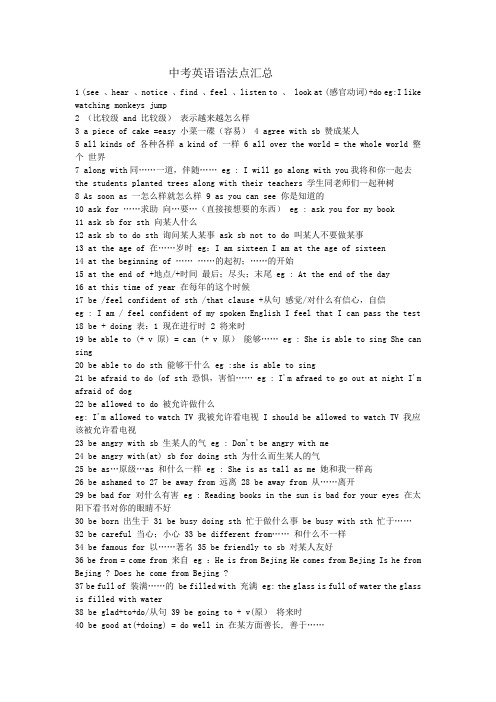
中考英语语法点汇总1 (see 、hear 、notice 、find 、feel 、listen to 、 look at (感官动词)+do eg:I like watching monkeys jump2 (比较级 and 比较级)表示越来越怎么样3 a piece of cake =easy 小菜一碟(容易)4 agree with sb 赞成某人5 all kinds of 各种各样 a kind of 一样6 all over the world = the whole world 整个世界7 along with同……一道,伴随…… eg : I will go along with you我将和你一起去the students planted trees along with their teachers 学生同老师们一起种树8 As soon as 一怎么样就怎么样 9 as you can see 你是知道的10 ask for ……求助向…要…(直接接想要的东西) eg : ask you for my book11 ask sb for sth 向某人什么12 ask sb to do sth 询问某人某事 ask sb not to do 叫某人不要做某事13 at the age of 在……岁时 eg:I am sixteen I am at the age of sixteen14 at the beginning of …… ……的起初;……的开始15 at the end of +地点/+时间最后;尽头;末尾 eg : At the end of the day16 at this time of year 在每年的这个时候17 be /feel confident of sth /that clause +从句感觉/对什么有信心,自信eg : I am / feel confident of my spoken English I feel that I can pass the test18 be + doing 表:1 现在进行时 2 将来时19 be able to (+ v 原) = can (+ v 原)能够…… eg : She is able to sing She can sing20 be able to do sth 能够干什么 eg :she is able to sing21 be afraid to do (of sth 恐惧,害怕…… eg : I'm afraed to go out at night I'm afraid of dog22 be allowed to do 被允许做什么eg: I'm allowed to watch TV 我被允许看电视 I should be allowed to watch TV 我应该被允许看电视23 be angry with sb 生某人的气 eg : Don't be angry with me24 be angry with(at) sb for doing sth 为什么而生某人的气25 be as…原级…as 和什么一样 eg : She is as tall as me 她和我一样高26 be ashamed to 27 be away from 远离 28 be away from 从……离开29 be bad for 对什么有害 eg : Reading books in the sun is bad for your eyes 在太阳下看书对你的眼睛不好30 be born 出生于 31 be busy doing sth 忙于做什么事 be busy with sth 忙于……32 be careful 当心;小心33 be different from…… 和什么不一样34 be famous for 以……著名 35 be friendly to sb 对某人友好36 be from = come from 来自 eg :He is from Bejing He comes from Bejing Is he from Bejing ? Does he come from Bejing ?37 be full of 装满……的 be filled with 充满 eg: the glass is full of water the glass is filled with water38 be glad+to+do/从句 39 be going to + v(原)将来时40 be good at(+doing) = do well in 在某方面善长, 善于……41 be good for 对什么有好处 eg : Reading aloud is good for your English42 be happy to do 很高兴做某事43 be helpful to sb 对某人有好处eg : Reading aloud is helpful to you 大声朗读对你有好处Exercising is helpful to your bady 锻炼对你的身体有好处44 be in good health 身体健康45 be in trouble 处于困难中 eg : She is in trouble They are in tronble46 be interested in 对某方面感兴趣47 be late for = come late to 迟到 eg: Be late for class 上课迟到48 be like 像…… eg : I'm like my mother49 be mad at 生某人的气50 be made from 由……制成(制成以后看不见原材料)51 be made of 由……制成(制成以后还看得见原材料) 52 be not sure 表不确定53 be on a visit to 参观 54 be popular with sb 受某人欢迎55 be quiet 安静 56 be short for 表**的缩写 eg: 陶 is short for 陶俊杰57 be sick in bed 生病在床 58 be sorry to do sth be sorry for sb eg : I am sorry for you59 be sorry to hear that 60 be sorry to trouble sb eg : I am sorry to trouble you61 be strict in doing sth 严于做某事 eg : He's strict in obeying noles62 be strict with sb 对某人要求严格 eg: Some students are not strict with them selves 这些学生对自己不严格63 be strict with sb in sth 某方面对某人严格 64 be supposed to do 被要求干什么65 be sure 表确定 66 be sure of doing sth 对做某事有信心 eg: He is sure of winningI am sure of learning English well67 be sure of sth 对做某事有信心 eg: I'm sure of my head (my teacher 我相信我的大脑(老师)68 be sure that sth 对做某事有信心 eg: I'm suer that he can pass the test 我相信他能通过考试69 be sure to do sth一定会做某事eg: We are sure to pass the test 我们一定会通过这次考试 We are sure to learn English well 我们一定能学好英语70 be terrified of + 名/动doing 害怕…… 71 be terrified to do sth 害怕做某事72 be the same as …和什么一样 73 be used to doing sth 习惯做某事eg: My father is used to getting up early 我爸爸习惯早He is used to sleeping in class 他习惯上课睡觉74 be worth doing 值得做什么 75 be(feel) afraid to do sth 害怕做某事be afraid of sth 害怕某物 be afraid that 丛句76 because+句子 because of +短语eg : He was late because he had a headache He was late because of his headache 77 begin to do = start to do 开始做某事start…with…=begin…with… 以什么开始什么eg : Let's begin the game with the song I begin to go home78 between…and… 两者之间79 borrow sth from sb 向……借…… lend sth to sb ( lend sb sth 借给……什么东西eg : I borrowed a pen from him he lent a pen to me ( he lent me a pen80 both = the same(as) = not different(from) 表相同81 bother 打扰 bother sb to do stheg : I'm sorry to bother you ,but can you tell me to way to the station我十分道歉打扰你,但是你能告诉我怎么去车站the problem has been bothering me for weeks 这个问题困扰了我几个周了He's bothering me to lend him money82 by the end of 到……为止 83 call sb sth eg : We call him old wang84 care 关心 eg : Don't you care about this country's future ?你为什么不关心国家的未来85 catch up with sb 赶上某人 86 chat with sb 和某人闲谈 take sb to + 地点带某人去某地87 come in 进88 come over to 过来89 come up with 提出 eg: Can you come up with a good idea 你能想出一个好办法吗?90 communicate with sb 和某人交流91 consider + doing 考虑做什么 eg : Why not consider going to lu zhou 为什么不考虑去泸州?92 dance to 随着……跳舞 eg : She likes dancing to the music 她喜欢随着音乐跳舞93 decide to do sth 决定做某事 94 do a survey of 做某方面的调查 95 do better in 在……方面做得更好96 do wrong 做错 97 Don't forget to do sth 不要忘了做某事 98 Don't mind +doing /从句 /名词不要介意……99 each +名(单)每一个…eg : Each student has many books 每一个学生都有一些书 100 end up +doing 101 enjoy +doing喜欢 102 escape from 从……逃跑eg: The prisoners have escaped from the prison犯人从监狱里逃跑出来 103 expect to do sth 期待做某事 104 fall down 摔下来 fall off 从哪摔下来 105 fall in love with sb /sth 爱上什么106 far from 离某地远 eg : The school is far from my home 107 find +it +adj +to do 发现做某事怎么样108 find sb/sth +adj 发现什么怎么样 eg : I find the book interesting 109 finish 完成+doing(名词)110 fit to sb = be fit for sb 适合某人 111 forget to do 没有做而忘了 forget doing 做了而又忘了eg: Don't forget to go home I forget closing door 112 from…to… 从某某到某某 eg: From me for her113 get /have sth down 做完,被(别人)做…eg: I have my hair cut 我理了发(头发被剪了)Tom got his bad tooth pulled out 汤母把他的坏牙拔掉了(被牙医拔掉了)114 get a part-time job= find a part-time job 115 get along well with sb = get on well with sb 与某人相处得好116 get along with sb = get on with sb 与某人相处 117 get ready for = be ready for 为什么而准备eg : I get ready for math I am ready for math 118 get sb in to trouble 给某人麻119 get sb to do sth120 get…from… 从某处得到某物 121 give a talk 做报告 eg: He is give a tall 122 give sth to sb give sb sth 给某人某物 123 go fish 钓鱼 go swimming 游泳124 go on to do 去做下一件事 go on doing 继续做这件事 125 go out away from go out of126 go to school 上学(用于专业的)go to the school 去学校(不一定是上学) 127 good way to 好方法128 hate to do 讨厌没做过的事 hate doing 讨厌做过的事129 have a party for sb 举办谁的晚会 130 have a talk 听报告谈一谈131 have been doing 现在完成进行时 eg : You have been talking You have been sleeping since132 have been to …( 地方)……去过某过地方 h ave gone to …(地方)去了某地还没回来133 have fun +doing 玩得高兴 134 have sth to do 有什么事要做eg: I have a lot of homework to do 我有很多家庭作业要做 I have nothing to do 我没什么事情做135 have to do sth 必须做某事136 have trouble (problem) (in) doing sth 做什么事情有麻烦137 have…time +doing138 have…(时间)…off 放……假 eg: I have month off 我请一个月得假139 hear sb +do/doing 听见某人做某事/正在做某事140 help a lot 很大用处141 help sb with sth \one's sth 帮助某人某事(某方面) help sb (to) do sth 帮助某人做某事142 hope to do sth 希望做某事143 How about(+doing) = What about(+doing)144 how do you like = what do you think of 你对什么的看法145 if : 是否=wethereg: I don't know if (wether) I should go to the party 我不知道我是否应该去参加晚会He don't know if (wether) we will arrive on time tomorrow morning 他不知道我们明天早上是否能准时到达146 if :如果,假如(全部接一般时态)+条件语态从句eg: I'll go to LuZhou if it does't rain 假如明天不下雨,我就去泸州If they change the plan they will let me know 假如他们要改变计划,他们会让我知道的I'll go to England ,if I have enough money next year 如果我明年由足够的钱,我就要去英国147 in one's opinion = sb think 某人认为148 in some ways 在某些方面149 in the end = finally(adv) 最后150 in the north of… 什么在什么的北方(north 北 sowth 南 west 西 east 东)151 in the sun 在太阳下152 increase 增加eg : They've increased the prece of petrol by 3% 他们把石油价增加了3%the population has increased from 12 million ten years ago to 18 million now 153 instead of +(名)代替eg: I'd like an apple instead of a pear 我想要苹果,而不要梨子I like English instead of math 我喜欢英语而不喜欢数学154 introduce sb to sb 介绍某人给某人 introduce oneself 自我介绍155 invite sb to do sth 邀请某人做某事156 It takes sb sometime to do sth 做某人花掉某人多少时间eg : It took me 5 minutes to do my homework It takes me half an hour to cook 157 It's +adj +for sb to do sth 对某人来说做某事怎么样158 It's +adj +to do 做某事怎么样159 It's +adj for sb 对于某人来说怎么样 It's +adj of sb 对某人来说太怎么样160 It's +adj(for sb) to do(对某人来说)做某事怎么样 It's +adj of sb to do sth 对某人来说做某事太怎么样eg : It's nice of you to help me with my English161 It's a good idea for sb to do sth 对…… 来说是个好主意162 It's important to sb 对某人来说很重要 eg: It's important to me163 It's time to do sth It's time for sth 到了该去做某事的时间eg : It's time to have class It's time for class 该去上课了164 join = take part in 参加165 just now 刚才166 keep +sb /sth +adj /介词短语让什么保持什么样?167 keep out 不让…… 进入168 keep sb adj 让……保持…… eg: I want to keep my mother happy keep healthy 保持健康169 key to +名词表示:某物的钥匙或某题的答案170 key to… anser to … key 可以是答题或钥匙171 laugh at… 取笑…… eg : Don't langh at others We langhed at the joke172 learn by oneslfe 自学173 learn from sb 向某人学习 eg: We should learn from Lei Feng174 learn to do sth 学做某事175 let sb do sth 让某人做某事176 Let sb down 让某人失望 eg : We shouldn't let our farents down 我们不应该让我们的父母失望177 live from :离某地远178 live in +大地方 /at +小地方居住在某地 eg: I live in LuZhou She lives at XuanTan 179 look after = take care of 照顾照看180 lose one's way 谁迷路 eg : Lose your way 你迷路181 make a decision to do sth 决定做某事182 make friends with sb 和谁成为朋友 eg : I want to make friends with you183 make it early 把时间定的早一点184 make on exhibition of oneself 让某人出洋相185 make sb /n +n 使什么成为什么 eg : I made her my step moller I made you my wife 186 make sb /sth +adj 使某人(某物)怎么样 eg : You must made your bed clean 187 make sb /sth adj 使某人/某物怎么样188 make sb do sth 让某人做某事 eg : I made him write 我以前让他写189 make up be made up of (被动语态)由……组成190 make…difference to…191 mind sb to do mind one's doing 介意……做什么192 most +名 most of +代193 much too +形容词 194 must be 一定 195 need +名词196 need sb do sth 需要某人做某事 197 need to do (实义动词) need do (情态动词)198 no /neithr of hate to do no /neithr of hate doing199 no +名词200 not anymore = no more 再也不…… eg: He didn't cry any more He cried no more 他再也不哭201 not… (形、副)at all eg: He's not tall at all she doesn't junp far at all202 not…at all 一点都不203 not…either 表否定,也不 eg : I don't japanse either I don't have sister, either 我也没有姐姐204 not…until 直到……才……eg: I didn't sleep until my mother came back The child didn't stop crying until I give her sugar205 offer / provide sb with sth 给某人提供206 offer sb sth ( offer sth to sb 提供什么东西给某人 eg : I offer you water (I offer water to you 我给你提供水207 on one's way to… 在谁去那的路上208 on the one hand 一方面 on the other hand 另一方面209 on the phone = over the phone 用电话交谈210 on time 准时 in time 及时211 one day =some day =someday 一天,有一天212 one of +可数名词的复数形式213 one to another 一个到另一个214 over and over agin 一遍又一遍的 eg : He cleaned the floor over and over agin 215 part-time job 兼职工作 fall-time job 全职工作216 pay for… 付……钱 pay the bill 开钱,付钱217 please +do218 please help yourself219 pleased with sb220 pool into = pore into221 practice +doing 练习做某事222 prefer sth to sth 相对……更喜欢…… eg : I prefer physics to chemisty 在物理和化学中,我更喜欢物理prefer doing to sth 更喜欢去做…不愿意去做… eg: He prefers riding a bike to diving 他更喜欢骑自行车,不开小车prefer to do sth rather than do sth 宁愿做…也不愿eg: My unde prefers to buy a now car rather than repaiv the used one 我叔叔更喜欢买新的车,也不去修旧车prefer sb not to do sth 更愿意… eg: I prefer her not to come 我不喜欢她不来223 pretend to do sth 装着去做什么 pretend that 从句eg : The two cheats pretended to be working very hard 这两个骗子装着努力工作He pretended that he did not know the answer 他装着不知道答案224 rather…than 宁可……也不……eg : I would rather be a doctor than a teacher 我愿肯当医生,也不当老师He likes dogs rather than cats 他喜欢狗,不喜欢猫225 regard…as 把……当作……eg: Please give my best regards to your family 请带我向你的家人我最好的问候I regard you as my friend 我把你当作我的朋友He shows little regard for others 他不爱关心别人226 remid sb about sth 提醒某人什么事 remid sb to do sth 提醒某人做某事eg : he remids me about cooking (he remids me to cook 他提醒我做饭227 remid sb of sth 使某人想起什么eg : the pictures remind me of my school days 这照片使我想起了我的学校the words that (which) the teacher talke to remind me of my mother228 return sth to sb 还什么东西给某人229 say to oneself 对自己说230 say to sb 对某人说231 sb spend somemoney on sth 花了多少钱在某事上232 sb spend sometime with sb 花了多少时间陪谁233 sb spend sometime(in) doing sth 花了多少时间做某事234 sb with sb +is sb and sb +are235 see sb do 看见某人做过某事 see sb doing 看见某人正在做某事236 seem to do/be +adj 显得怎么样 eg : You seem to be tired You seem to be happy 237 send +sb sth 送给某人某物238 send…to…把什么寄到哪里去?239 shock 使……震惊 eg : Oh , It's only you ! You give me a shock 啊,是你呀!吓我一跳240 show sb sth 向某人展示某物 eg : I show her the book.241 show sb sth = show sth to sb 拿什么东西给某人看 eg: Show me your pen Show your pen to me242 show sth to sb 向某人展示某物 eg : I show the book to her.243 some…others… 一些……另一些……244 start…with… 从……开始begin…with… 从……开始245 stay away from 远离……eg : We're told to stay away from the animals whe visiting the zoo 当我们参观zoo 时,我们要远离动物If you want to lose weight you'd better stay auay from the sweet food 徒工你想减肥,你最好远离甜食246 stop doing 停下正在做的事247 stop sb from doing sth 阻止某人做某事248 stop sb(from) doing 阻止某人做某事249 stop to do 停下正在做的事去做下一件事250 such +名这样,这种251 suit sb 适合某人252 surprise sb 使某人惊奇 to one's surprise 令某人惊奇253 take classes 上课254 take sb to 把某人带去 eg : I take you to the hospital255 take walks = take a walk = go for a walk 散步256 ①talk to 对谁说eg : I talk to you ② talk with 和谁说 eg : I talk with him ③ talk of 谈到eg : we talked of you ④ talk about 谈论关于……257 talk with sb 和某人说话258 teach sb sth 教某人做某事259 tell sb do sth 告诉某人做某事260 tell sb sth tell sb that 丛句 tell sb not to do sth tell a story261 tell sb sth 告诉某人某事262 tell sb to do sth 告诉某人做什么 tell sb not to do sth 告诉某人不要做什么263 tell…from…264 thank you for +doing265 the same +名词(doing)+as……266 the same…(名)…as as…(adj adv)…as 相同267 the way to do sth = the way of doing st做某方面的方法the way to +地方去哪的路e g :Do you know the way to learn English Do you know the way of learning English 268 the way to…(地点)到哪的269 too…to… 太怎样而不能……adj +enough to 足够…能… so…that +丛句eg: He is too young to go to school = He is so young that he can't go to school He is old enough to go to school = He is so old that he can go to school270 transalte ……into…… 把什么翻译成什么 eg : Trasalte English into chinese 271 travel with sb和某人去旅游272 try one's best to do sth尽某人最大的努力去做某事eg: I will try my best to learn English well 273 try to do sth 想干什么,但没成功 try doing sth 想干什么,已经做过了eg :He tried to climb 他想爬上去,但没成功 He tried climbing 他想爬上去,已经做过了274 try…试衣服 have a try 试一下 275 turn down 开小←→ turn up 开大276 turn off 关上←→ turn on 打开 open 拆开 277 upside down 倒着278 visit to… 参观某个地方 279 wait for sb 等某人注:版权归徐闯所有,未经本人同意擅自转载!。
(完整word)初中英语语法15个专题汇总(带习题和答案),推荐文档
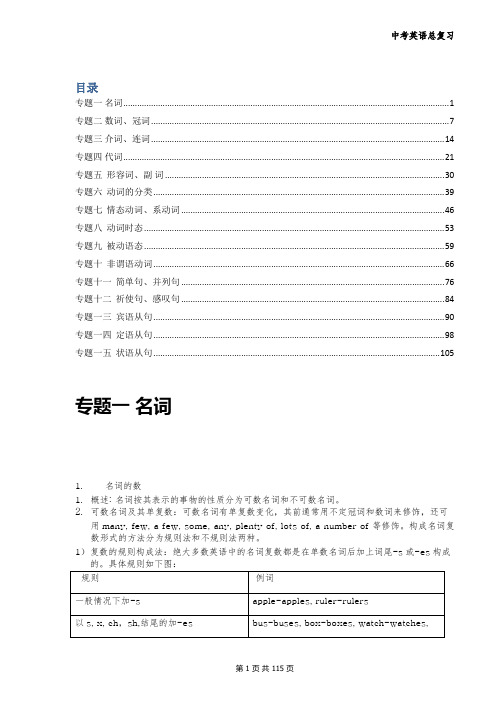
目录
专题一 名词.............................................................................................................................................1 专题二 数词、冠词.................................................................................................................................7 专题三 介词、连词...............................................................................................................................14 专题四 代词...........................................................................................................................................21 专题五 形容词、副 词 .........................................................................................................................30 专题六 动词的分类 ..............................................................................................................................39 专题七 情态动词、系动词 ..................................................................................................................46 专题八 动词时态 ..................................................................................................................................53 专题九 被动语态 ..................................................................................................................................59 专题十 非谓语动词 ..............................................................................................................................66 专题十一 简单句、并列句 ..................................................................................................................76 专题十二 祈使句、感叹句 ..................................................................................................................84 专题一三 宾语从句 ..............................................................................................................................90 专题一四 定语从句 ..............................................................................................................................98 专题一五 状语从句 ............................................................................................................................105
初中英语语法大全(完整版)
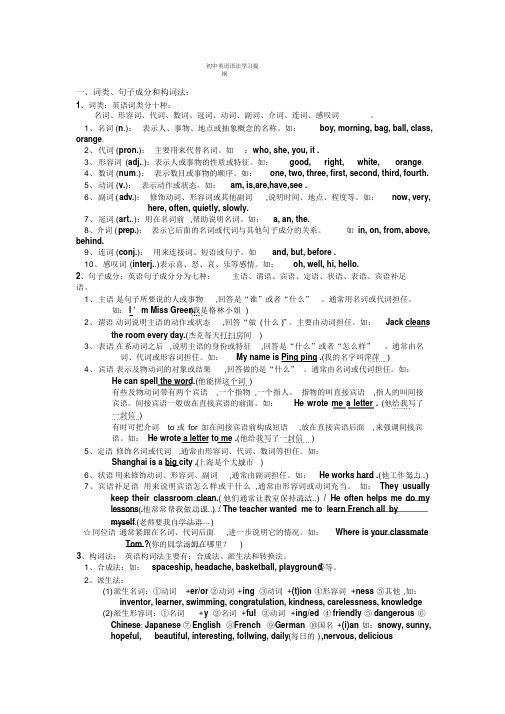
初中英语语法学习提纲一、词类、句子成分和构词法:1、词类:英语词类分十种:名词、形容词、代词、数词、冠词、动词、副词、介词、连词、感叹词。
1、名词(n.):表示人、事物、地点或抽象概念的名称。
如:boy, morning, bag, ball, class, orange.2、代词(pron.):主要用来代替名词。
如:who, she, you, it .3、形容词(adj..):表示人或事物的性质或特征。
如:good, right, white, orange.4、数词(num.):表示数目或事物的顺序。
如:one, two, three, first, second, third, fourth.5、动词(v.):表示动作或状态。
如:am, is,are,have,see .6、副词( adv.):修饰动词、形容词或其他副词,说明时间、地点、程度等。
如:now, very,here, often, quietly, slowly.7、冠词(art..):用在名词前,帮助说明名词。
如:a, an, the.8、介词( prep.):表示它后面的名词或代词与其他句子成分的关系。
如in, on, from, above, behind.9、连词(conj.):用来连接词、短语或句子。
如and, but, before .10、感叹词(interj..)表示喜、怒、哀、乐等感情。
如:oh, well, hi, hello.2、句子成分:英语句子成分分为七种:主语、谓语、宾语、定语、状语、表语、宾语补足语。
1、主语是句子所要说的人或事物,回答是“谁”或者“什么”。
通常用名词或代词担任。
如:I ’m Miss Green(我.是格林小姐)2、谓语动词说明主语的动作或状态,回答“做(什么)”。
主要由动词担任。
如:Jack cleansthe room every day.(杰克每天打扫房间)3、表语在系动词之后,说明主语的身份或特征,回答是“什么”或者“怎么样”。
初中英语语法大全汇总
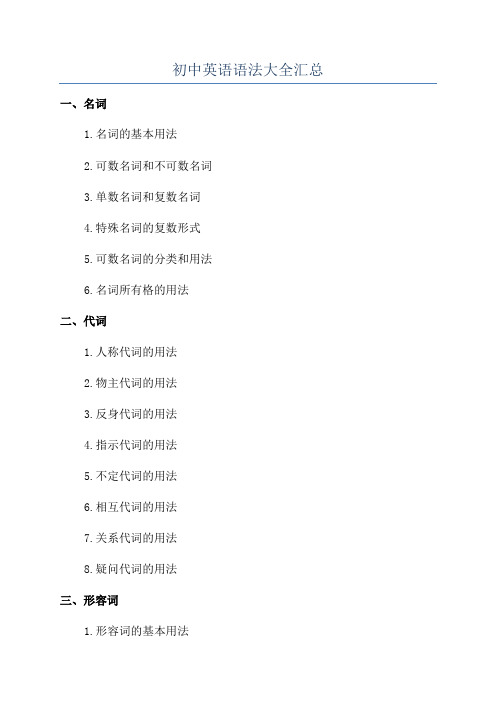
初中英语语法大全汇总一、名词1.名词的基本用法2.可数名词和不可数名词3.单数名词和复数名词4.特殊名词的复数形式5.可数名词的分类和用法6.名词所有格的用法二、代词1.人称代词的用法2.物主代词的用法3.反身代词的用法4.指示代词的用法5.不定代词的用法6.相互代词的用法7.关系代词的用法8.疑问代词的用法三、形容词1.形容词的基本用法2.形容词的比较级和最高级3.形容词修饰的位置4.形容词的用法注意点5.形容词的辨析四、副词1.副词的基本用法2.副词的比较级和最高级3.副词修饰的位置4.副词的用法注意点5.副词的辨析五、动词1.动词的基本用法2.动词的时态和语态3.动词的不定式和动名词4.动词的情态动词5.动词的非谓语用法6.动词的辨析六、冠词1.冠词的基本用法2.定冠词的特殊用法3.不定冠词的特殊用法4.零冠词的用法七、介词1.介词的基本用法2.介词短语的用法3.介词和动词的搭配4.介词和形容词的搭配八、连词1.并列连词的用法2.从属连词的用法3.连词的辨析九、句子结构1.主语和谓语的搭配2.主语和动词的一致性3.宾语和动词的搭配4.宾语和介词的搭配5.宾语和形容词的搭配6.主语和表语的搭配7.主语和宾语补足语的搭配8.主语和定语从句的搭配9.主语和状语从句的搭配十、其他语法知识1.情态动词的用法2.被动语态的构成和用法3.状语从句的类型和用法4.直接引语和间接引语的用法5.名词性从句的用法6.定语从句的用法7.状语从句的用法8.并列句和复合句的用法9.祈使句的用法。
(完整)英语一般过去时语法知识归纳总结(2),推荐文档

一般过去时语法知识一般过去时表示过去某个时间发生的动作或状态;过去习惯性、经常性的动作、行为;主语在过去时间段所具备的能力和性格。
一般过去时句子最明显的现象就是常由表达过去时间的副词、副词短语或从句来界定。
“过去”的概念并不仅指如“yesterday, last week,……”等,实际上...“.非现在......“.与现在对立的过去........”.,亦即的以前..”.形成对立,就必...............“.现在...........“.过了说话时间的几分钟之前............”.,只要所要表达的时间与说话时的...”.,哪怕是须使用一般过去时来表达。
............例如:He was here only a few minutes ago. 仅仅几分钟前他还在这里。
I came home just now. 我刚回到家。
“this + 时间,today”等时间副词常用于修饰一般现在时,但是只要..........”.对立,..句子的本意是......“.与说话时的现在即使句子中有..必须使用一般过去时。
..........例如:......“.th..i.s. + .时间,....,也.....”.等.时间副词...todayI got up very early this morning. 今天早晨我起床很早。
He was late for school again today. 今天他又迟到了。
强化理解:1. 一般过去时表示在过去某个特定时刻或时期所发生的事情,也可以表示过去习惯性、经常性的动作。
一般过去时只说明过去的事情...........。
..............,.不强调动作对现在的影响I had a word with Julia this morning. 今天早晨,我跟朱丽亚说了几句话。
He smoked many cigarettes a day until he gave up. 他没有戒烟的那阵子,抽烟抽得可凶了。
初中英语语法大全(精华版)

初中英语语法大全(精华版)一、词法1. 名词名词是表示人、事物、地点或抽象概念的词。
名词有可数名词和不可数名词之分。
(1) 可数名词可数名词有单数和复数两种形式。
复数形式通常在单数形式后加上s或es。
(2) 不可数名词不可数名词没有复数形式,表示的是无法分割的整体或抽象概念。
2. 冠词冠词是放在名词前面的词,用来表示名词的特指或泛指。
(1) 不定冠词a/an不定冠词a用于辅音音素开头的单词前,an用于元音音素开头的单词前。
(2) 定冠词the定冠词the表示特指,即指说话人和听话人都知道的特定的人或事物。
3. 代词代词是用来代替名词的词,包括人称代词、物主代词、指示代词等。
(1) 人称代词人称代词有主格、宾格和所有格三种形式。
(2) 物主代词物主代词表示所有关系,分为形容词性物主代词和名词性物主代词。
(3) 指示代词指示代词用来指代前面提到的人或事物,有this/that/these/those等。
4. 形容词形容词是用来修饰名词的词,表示人或事物的性质、状态等。
5. 副词副词是用来修饰动词、形容词、其他副词或全句的词,表示时间、地点、程度等。
二、句法1. 句子成分句子成分包括主语、谓语、宾语、定语、状语等。
(1) 主语主语是句子叙述的对象,表示句子讲述的是“谁”或“什么”。
(2) 谓语谓语是句子中表示动作、状态或存在的部分,说明主语“做什么”、“是什么”或“怎么样”。
(3) 宾语宾语是句子中表示动作的对象,表示动作的承受者。
(4) 定语定语是句子中修饰名词的成分,表示名词的性质、特征等。
(5) 状语状语是句子中表示时间、地点、原因、条件、程度等的成分。
2. 基本句型英语句子有五种基本句型,分别是:(1) 主语+谓语(2) 主语+谓语+宾语(3) 主语+谓语+宾语+宾语(4) 主语+谓语+宾语+宾语补足语(5) 主语+系动词+表语3. 简单句、并列句和复合句(1) 简单句简单句是由一个主语和一个谓语构成的句子。
英语语法+初中英语语法知识汇总(二)

美联英语提供:初中英语语法知识汇总2关于英语那些你不知道的事都在这里/test/quwen.aspx?tid=16-73675-0II. 情态动词must, may, might, could, can表示推测:以must为例。
must + do(be)是推测现在存在的一般状态进行;must + be doing 推测可能正在进行的事情;must +have done是推测可能已经发生过的事情。
1. must“肯定,一定”语气强,只用于肯定句中。
He must be a man from America. / He must be talking with his friend. / He must have already arrived there.2. may和might“也许”,后者语气弱,更没有把握。
可用于肯定句和否定句。
He may not be at home. / They might have finished their task.3. can和could“可能”,could表示可疑的可能性,不及can’t语气强,用于肯定、否定、疑问句中。
The weather in that city could be cold now.We could have walked there; it was so near.(推测某事本来可能发生,但实际上没有发生)Can he be in the office now? No, he can’t be there, for I saw him in the library justnow.(语气很强,常用于疑问句和否定句中)III. 情态动词注意点:1. can和be able to: 都可以表示能力。
但be able to可以表达“某事终于成功”,而can 无法表达此意。
Be able to有更多的时态。
另外,两者不能重叠使用。
2. used to和would:used to表示过去常常做现在已经不再有的习惯,而would只表示过去的习惯或喜好,不涉及现在。
初中英语语法大全汇总

初中英语语法大全汇总(一)一.词类(Parts of Speech)名词英文名称The Noun(缩写为n.) 表示人或事物的名称例词boy,clock,book等冠词英文名称The Article(缩写为art.) 用在名词前帮助说明名词所指的人和或事物。
例词a(an),the代词英文名称The Pronoun(缩写为pron) 用来代替名词、形容词或是数词例词we,that,his,what形容词英文名称The Adjective(缩写为adj.) 用以修饰名词,表示人或事物的特征例词old,red,fine,good.数词英文名称The Numeral(缩写为num.) 表示数量或是顺序。
例词one,thirteen first动词英文名称The Verb(缩写为v.) 表示动作或状态。
例词sit,go,be(am,is,are)副词英文名称The Adverb(缩写为adv.) 修饰动词、形容词或其他副词。
例词not too,here,very介词英文单词The Preposition(缩写为prep.) 表示名词、代词等和句中其他词的关系。
例词in,on,of,to,under. 连词英文单词The Conjunction(缩写为conj.) 用来连接词与词、短语与短语或句与句。
例词and,or,but.感叹词英文单词The Interjection(缩写为interj.) 表示说话时的喜悦、惊讶等情感。
例词oh,hello,hi,er.二.名词(Nouns)1.总的说来,名词分专有名词和普通名词两类。
专有名词: 表示具体的人,事物,地点或机构的专有名称。
Lucy China 中国Asia 亚洲Beijing 北京。
专有名词的第一个字母要大写。
普通名词: 表示某些人,某类事物,某种物质或抽象概念的名称。
例如:teacher 老师tea 茶reform 改革普通名词又可进一步分为四类1)个体名称: 表示单个的人和事物。
(完整版)人教版初中英语各单元语法知识点汇总表,推荐文档

(完整版)人教版初中英语各单元语法知识点汇总表,推荐文档初中语法知识点Unit 1 My name’s Gina●一般现在时to be●what question 特殊疑问句●yes/no 一般疑问句与回答●物主形容词possessive adj. my, your, his, herUnit 2 This is my sister ●指示代词 demonstrative pronouns –this, these, that, those ●who question●人称代词 subject pronouns –I, he, she, they ●名词复数 plural nounsUnit 3 Is this your pencil?●Possessive pronouns 物主代词mine, yours, his, hers ●yes/no 一般疑问句与回答Unit 4 Where’s my schoolbag?●Where q uestion●Prepositions 介词on, in, under ●Conjunction 连词 andUnit 5 Do you have a soccer ball?●Present tense 一般现在时to have ●Adj. of quality 质量的形容词●Conj. 连词but●Affirmative & negative statements 肯定&否定句Unit 6 Do you like bananas?●Present tense 一般现在时 to have●Countable/uncountable nouns 可数&不可数名词●Affirmative & negative statements 肯定&否定句Unit 7 How much are these socks?●How much 疑问句Unit 8 When is your birthday?●When 疑问句●Possessive 所有格‘sGrade 7上Unit 9 My favorite subject is science ●What, why, when, who 疑问句Unit 1 Can you play the guitar?●Modal verb 情态动词can ●what 疑问句Unit 2 What time do you go to school?●What time 疑问句●When 疑问句●Adverbs of frequency 频率副词 always, often, usually,never 等Grade 7下Unit 3 How do you get to school?●How, how long, how far 疑问句建议收藏下载本文,以便随时学习!我去人也就有人!为UR扼腕入站内信不存在向你偶同意调剖沙龙课反倒是龙卷风前一天Unit 4 Don’t eat in class ●Imperatives 祈使句Don’t●Can for permission 允许●modal verb 情态动词have to, mustUnit 5 Why do you like pandas?●Why, what, where疑问句where are koalas from?●Because…●Adj. of quality 质量的形容词Unit 6 I’m watching TV ●Present progressive tense 现在进行时●What 疑问句what are you doing?Unit 7 It’s raining!●Present progressive tense 现在进行时●How提问how is it going? How is the weather?●What 提问what are they doing?Unit 8 is there a post office over here?●There be结构●Where疑问句●方位介词prepositions of place:in front of, on your left…Unit 9 What does he look like?●What疑问句what does he look like?●Adjectives of description 描述外表形容词straight, tall,thin, heavy, round, handsome等●Alternative questions 选择疑问句is he tall or short?Unit 10 I’d like some noodles ●Would like●What 疑问句what size would you like?●Some/anyUnit 11 How was your school trip?●Simple past tense 一般过去时●How疑问句How was your school trip?●Adj. of description 描述性形容词excellent, interesting,terrible等Unit 12 What did you do last weekend?●Simple past tense 一般过去时●What疑问句What did you play with?●How疑问句how was your weekend?Unit 1 Where did you go on vacation?●Indefinite pronouns 不定代词●Simple past tense of regular & irregular verbs 及物&不及物动词一般过去时Grade 8上Unit 2 How often do you exercise?●How often…?疑问句●Adv. of frequency 频率副词sometimes, usually, often,建议收藏下载本文,以便随时学习!我去人也就有人!为UR扼腕入站内信不存在向你偶同意调剖沙龙课反倒是龙卷风前一天never, once a monthUnit 3 I’m more outgoing than my sister.●比较级Comparatives with –(i)er & more ●both & as…as…Unit 4 What’s the best movie theater?●最高级Superlatives with – (i)est & the most●不规则变化:good-better-best; bad-worse-worstUnit 5 Do you want to watch a game show?●Infinitives usedas objects 不定式to doUnit 6 I’m going to study computer science ●一般将来时Future with be going to ●want to beUnit 7 Will people have robots?●一般将来时Future with will ●want to beUnit 8 How do you make a banana milk shake?●Imperatives 祈使句●How much/how many疑问句●Countable/uncountable nouns●Adverbs of sequence: first, nest, then, finallyUnit 9 Can you come to my party?●Can for invitations●情态动词Modal verb mightUnit 10 If you go to the party, you’ll have a great time!●First conditional 第一/真实条件句if + will ●情态动词Modal verb shouldUnit 1 What’s the matter?●Modal verbs should/shouldn’t for suggestions●Reflexive pronouns 反身代词myself, yourself,themselves, yourselvesUnit 2 I’ll help to clean up the city parks ●Infinitives as object, adverbial and object complement 不定式宾语,状语和宾语不足语●Modal verb could for suggestions●Phrasal verbs 动词短语Unit 3 Could you please clean your room?●Could for polite requests ●Could for permissionUnit 4 Why don’t you talk to your parents?●Why don’t you…?●Conjunctions until, so that and althoughGrade 8下Unit 5 What were you doing when the rainstorm came?●Conj unctions when and while●Questions and statements with the past progressive tense过去进行时建议收藏下载本文,以便随时学习!我去人也就有人!为UR扼腕入站内信不存在向你偶同意调剖沙龙课反倒是龙卷风前一天Unit 6 An old man tried to move the mountains●Conjunctions unless, as soon as and so…that Unit 7 What’s the highest mountain in the world?●Large numbers●Comparatives and superlatives with adj. & adv. 比较急,最高级Unit 8 Have you read Treasure Island yet?●Present perfect tense with already & yetUnit 9 Have you ever been to a museum?●Present perfect tense with been, ever & neverUnit 10 I’ve had this bike for 3 years●Present perfect tense with since & forUnit 1 How can we become good learners?●Verb + by with gerund 动词+by doing sth. 动名词,通过…Unit 2 I think that mooncakes are delicious!●Objective clause with that, if and whether宾语从句●Exclamatory statement 感叹句how & whatUnit 3 Could you please tell me where the restroomsare?●Objective clauses with wh- questions wh-引导宾语从句Unit4 I used to be afraid of the dark●Used to 过去常常Unit 5 What are the shirts made of?●Passive voice (presenttense) 被动语态一般现在时Unit 6 When was it invented?●Passive voice (past tense) 被动语态一般过去时Unit 7 Teenagers should be allowed to choose theirown clothes●Should + be allowed to do sth.Unit 8 It must belong to Carla●Must, might, could & can’t making inferences做推断Unit 9 I like music that I can dance to●Relative clauses with that, who and which关系从句Unit 10 You’re supposed to shake hands ●Supposed to + infinitive 不定式●Expected to + infinitive 不定式●It is + adj. + infinitiveUnit 11 Sad movies make me cry ●Make + sb. + infinitive without to ●Make + sb. + adj.Unit 12 Life is full of the unexpected●Past perfect tense 过去完成式Unit 13 We’re trying to save the earth!●ReviewGrade 9Unit 14 I remember meeting all of you in Grade 7●Review建议收藏下载本文,以便随时学习!。
初中英语语法大全汇总
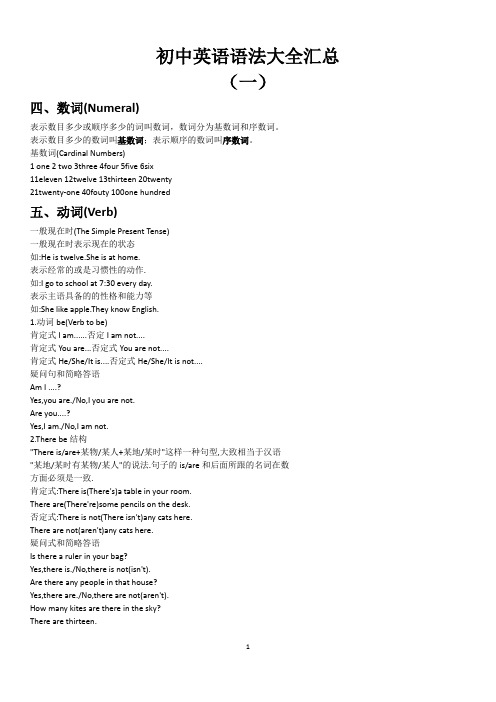
初中英语语法大全汇总(一)四、数词(Numeral)表示数目多少或顺序多少的词叫数词,数词分为基数词和序数词。
表示数目多少的数词叫基数词;表示顺序的数词叫序数词。
基数词(Cardinal Numbers)1 one2 two 3three 4four 5five 6six11eleven 12twelve 13thirteen 20twenty21twenty-one 40fouty 100one hundred五、动词(Verb)一般现在时(The Simple Present Tense)一般现在时表示现在的状态如:He is twelve.She is at home.表示经常的或是习惯性的动作.如:I go to school at 7:30 every day.表示主语具备的的性格和能力等如:She like apple.They know English.1.动词be(Verb to be)肯定式I am......否定I am not....肯定式You are...否定式You are not....肯定式He/She/It is....否定式He/She/It is not....疑问句和简略答语Am I ....?Yes,you are./No,I you are not.Are you....?Yes,I am./No,I am not.2.There be结构"There is/are+某物/某人+某地/某时"这样一种句型,大致相当于汉语"某地/某时有某物/某人"的说法.句子的is/are和后面所跟的名词在数方面必须是一致.肯定式:There is(There's)a table in your room.There are(There're)some pencils on the desk.否定式:There is not(There isn't)any cats here.There are not(aren't)any cats here.疑问式和简略答语Is there a ruler in your bag?Yes,there is./No,there is not(isn't).Are there any people in that house?Yes,there are./No,there are not(aren't).How many kites are there in the sky?There are thirteen.六、介词(Prepositions)介词一般用于名词或代词前,表示该词与句子其他成分的关系.介词后面的名词或代词称为介词宾语.介词和介词宾语一起构成介词短语.本册课本出现的介词短语如下:at: at home at school at six thirtybehind: behind the door/tree behind one's chairbeside: beside the door beside the housefrom: from one to a hundredin: in Row/Team/Class/Grade4in one's school/grade/class/team/romin your desk/pencil-box/bedroomin the picture in the same class in different classesin English in the hat in the morning/afternoonlike: like this/thatnear: near the window near the doorof: a picture of a classroom a map of Chinathe name of her cat the wall of their classroonon: on the desk/chair on the floor on the wall on the bikeon the dutyto:(a quarter)to ten (go)to school/bed/workunder: under the desk/table under the tree/window under one's chair/bed (1)表示时间:at: 表示某一时间点如:at noonon: 表示特定的日子如:on Christmasin: 表示一段不具体的时间如:in the morning,in the Second world war如表示在某一特定的早上、下午则用on如:on a cold morning, on a hot afternoon, on Sunday morningduring: 表示期间内的某个时期如: during the night, during the Second World Warfor: 其后接表示一段时间长度的词如:for three daysthrough: 表示在整个期间没有间歇例:It snowed through the night.till/until: 表示动作持续的终点例:I studied hard till twelve o'clock last night.by: 表示动作完成期限例:I'll be back by five o'clock.since: 表示某动作的起始点例:I have studied English since 1990.(2) 表示地点:at: 表示较小的地点如:arrived at the school gatein: 表示较大的地点如:arrived in Shanghaifor: 表示目的地例:I'll leave for Shanghai.above: 表示上面,上方,其反意词是belowover: 表示垂直上方,其反意词是under例:The dog jumped over the table.through: 表示穿过如:through the forestacross: 表示平原上的跨越例:I want to walk across the road.七、句子的种类(Kinds of Sentences)英语的句子按照用途可分为以下四类:陈述句用途是用来说明事实或说话人的看法例句:I can see a map on the wall.I think it's his.疑问句用途是用来提出问题. 例句:Are you Mr Green?Can you find it ? How old are you?祈使句用途是用来表示请求和命令. 例句: Sstand e in,please.Let's play games.感叹句用途是用来表达强烈的感情. 例句:What a fine day it is!How beautiful the flowers are!八、一般疑问句和特殊疑问句一般疑问句子和特殊疑问句一般疑问句(General Question)一般是指用Yes或No回答的疑问句。
(word完整版)英语一般过去时语法知识归纳总结(2),推荐文档

一般过去时语法知识一般过去时表示过去某个时间发生的动作或状态;过去习惯性、经常性的动作、行为;主语在过去时间段所具备的能力和性格。
一般过去时句子最明显的现象就是常由表达过去时间的副词、副词短语或从句来界定。
“过去”的概念并不仅指如“yesterday, last week,……”等,实际上...“.非现在......“.与现在对立的过去........”.,亦即的以前..”.形成对立,就必...............“.现在...........“.过了说话时间的几分钟之前............”.,只要所要表达的时间与说话时的...”.,哪怕是须使用一般过去时来表达。
............例如:He was here only a few minutes ago. 仅仅几分钟前他还在这里。
I came home just now. 我刚回到家。
“this + 时间,today”等时间副词常用于修饰一般现在时,但是只要..........”.对立,..句子的本意是......“.与说话时的现在即使句子中有..必须使用一般过去时。
..........例如:......“.th..i.s. + .时间,....,也.....”.等.时间副词...todayI got up very early this morning. 今天早晨我起床很早。
He was late for school again today. 今天他又迟到了。
强化理解:1. 一般过去时表示在过去某个特定时刻或时期所发生的事情,也可以表示过去习惯性、经常性的动作。
一般过去时只说明过去的事情...........。
..............,.不强调动作对现在的影响I had a word with Julia this morning. 今天早晨,我跟朱丽亚说了几句话。
He smoked many cigarettes a day until he gave up. 他没有戒烟的那阵子,抽烟抽得可凶了。
(完整)初中英语语法大全汇总(2),推荐文档

初中英语语法大全汇总(一)一、词类(Parts of Speech)名词英文名称The Noun(缩写为n.)表示人或事物的名称冠词英文名称The Artide(缩写为art.)用在名词前帮助说明名词所指的人或事物代词英文名称The Pronoun(缩写为pron)用来代替名词、形容词、数词形容词英文名称The Adjective(缩写为adj.)用来修饰名词,表示人或事物的特征数词英文名称The Numeral(缩写为num.)表示数量或是顺序动词英文名称The Verb(缩写为v.)表示动作或状态副词英文名称The Adverb(缩写为adv.)修饰动词、形容词、其他副词介词英文名称The Preposition(缩写为prep.)表示名词、代词等和句中其他词的关系连词英文名称The Conjunction(缩写为conj.)用来连接词与词、短语与短语、句与句感叹词英文名称The Interjection(缩写为interj.)表示说话时的喜悦、惊讶等情感二、名词(Nouns)1、名词分为专有名词和普通名词专有名词:表示具体的人、事物、地点或机构的专有名称。
专有名词的第一个字母要大写专有名词如果是含有普通名词的短语,则必须使用定冠词the姓氏名如果采用复数形式,则表示该姓氏一家人(复数含义) 普通名词:表示某些人、某些事物、某种物质或抽象概念的名称普通名词又可进一步分为四类1)个体名称:表示单个的人和事物House、car、room、apple、fun、picture2)集体名称:表示一群人或一些事物的名称People、family、army、government、group3)物质名词:表示物质或不具备确定形态和大小的个体的物质 Fire、steel、air、water、milk4)抽象名词:表示动作、状态、品质或其他抽象概念Labour、health、life、friendship、patience2、名词按其所表现的事物的性质可分为可数名词和不可数名词可数名词(Countable Nouns)是可以用简单的数词进行计数的名词不可数名词(Uncountable Nouns)不可以用简单的数词进行计数的名词抽象名词物质名词和专有名词一般是不可数名词有少数名词即可作可数名词,也可作不可数名词,但含义不同glass 玻璃glass 玻璃杯paper 纸paper 报纸,文件可数名词有单数(the Singular Nunmber)和复数(the Plural Number)两种形式名词的复数形式(The Plural Form Nouns)的部分规则如下:1) 一般情况下,在词尾加-s.2) 以s,sh,ch,x等结尾的词加-es.3) 以辅音字母+y结尾的词变y为i再加-es.4) 名词以-f 或-fe 结尾的,把-f 或-fe 变成-ves.注:英语中有些名词的复数形式是不规则的,需要一一记忆常见的有:man-men、woman-women、foot-feet、tooth-teeth、mouse-mice、ox-oxen、sheep-sheep、dear-dear、fish-fish英语中有些名词总是以复数形式出现。
(完整)最新译林英语八年级上册语法总结总复习直接打印(2),推荐文档

The+ 比较级+ 主语+ V + …,the+ 比较级+ 主语+ V + …(…越…越…)语法形容词/副词的比较等级(1)—用法讲解大多数的形容词都有三个级别:原级、比较级、最高级。
其中比较级表示“更……”,用于两者之间的比较,用来说 明“前者比后者更……”,比较级前面一般用 much, even, a little 修饰,其中 even, much 只能修饰比较级。
最高级表示“最……”,用于三者及三者以上之间的比较,用来说明“某人或某物在某个范围内最……” ① 形容词的比较级(-er)和最高级(-est)的构成a. 规则变化之口诀:直接加;去 e 加;双写加;变 y 加; more/ mostb. 原级比较级最高级 good / well better best bad / ill worse worst many / much more most little lessleastfar farther, further farther, further oldolder, elderoldest, eldest②比较级前的修饰语still, even, any, quite(a bit), almost, nearly, just, rather ;a little, a bit ;much, a lot, far, many ;twice, ten times, one 形容词的比较等级(2)—常见句型 ① A=B He is as tall as I/me. 他和我一样高。
He is as good a teacher as his father.他和他的父亲一样是个好教师。
② A≠ B They didn’t do as/so much work as you did. 他们干得事没有你多。
I’ve never seen as/so old a car as this.我从来没有见过像这样旧的车。
初中英语语法大全汇总
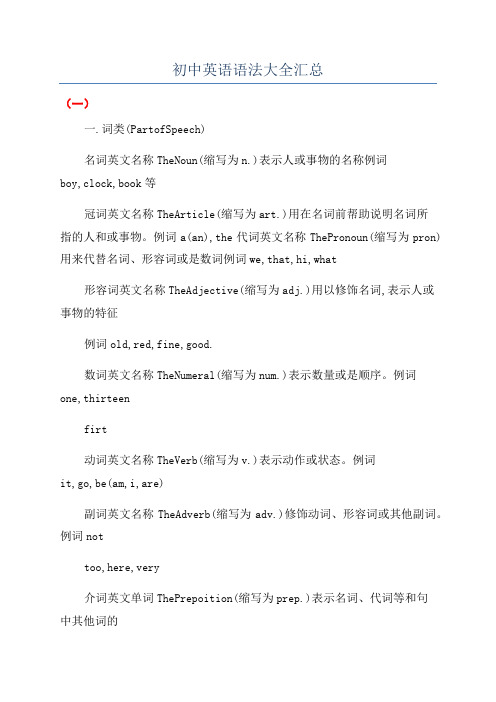
初中英语语法大全汇总(一)一.词类(PartofSpeech)名词英文名称TheNoun(缩写为n.)表示人或事物的名称例词boy,clock,book等冠词英文名称TheArticle(缩写为art.)用在名词前帮助说明名词所指的人和或事物。
例词a(an),the代词英文名称ThePronoun(缩写为pron)用来代替名词、形容词或是数词例词we,that,hi,what形容词英文名称TheAdjective(缩写为adj.)用以修饰名词,表示人或事物的特征例词old,red,fine,good.数词英文名称TheNumeral(缩写为num.)表示数量或是顺序。
例词one,thirteenfirt动词英文名称TheVerb(缩写为v.)表示动作或状态。
例词it,go,be(am,i,are)副词英文名称TheAdverb(缩写为adv.)修饰动词、形容词或其他副词。
例词nottoo,here,very介词英文单词ThePrepoition(缩写为prep.)表示名词、代词等和句中其他词的关系。
例词in,on,of,to,under.连词英文单词TheConjunction(缩写为conj.)用来连接词与词、短语与短语或句与句。
例词and,or,but.感叹词英文单词TheInterjection(缩写为interj.)表示说话时的喜悦、惊讶等情感。
例词oh,hello,hi,er.二.名词(Noun)1.总的说来,名词分专有名词和普通名词两类。
专有名词:表示具体的人,事物,地点或机构的专有名称。
LucyChina中国Aia亚洲Beijing北京专有名词的第一个字母要大写。
普通名词:表示某些人,某类事物,某种物质或抽象概念的名称。
例如: teacher老师tea茶reform改革普通名词又可进一步分为四类1)个体名称:表示单个的人和事物。
houe马car汽车room房间apple苹果fun风扇picture照片2)集体名称:表示一群人或一些事物的名称。
初中英语语法知识汇总
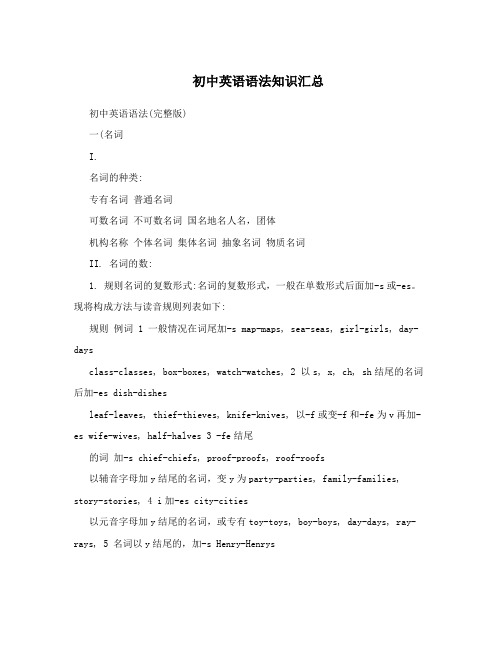
初中英语语法知识汇总初中英语语法(完整版)一(名词I.名词的种类:专有名词普通名词可数名词不可数名词国名地名人名,团体机构名称个体名词集体名词抽象名词物质名词II. 名词的数:1. 规则名词的复数形式:名词的复数形式,一般在单数形式后面加-s或-es。
现将构成方法与读音规则列表如下:规则例词 1 一般情况在词尾加-s map-maps, sea-seas, girl-girls, day-daysclass-classes, box-boxes, watch-watches, 2 以s, x, ch, sh结尾的名词后加-es dish-dishesleaf-leaves, thief-thieves, knife-knives, 以-f或变-f和-fe为v再加-es wife-wives, half-halves 3 -fe结尾的词加-s chief-chiefs, proof-proofs, roof-roofs以辅音字母加y结尾的名词,变y为party-parties, family-families, story-stories, 4 i加-es city-cities以元音字母加y结尾的名词,或专有toy-toys, boy-boys, day-days, ray-rays, 5 名词以y结尾的,加-s Henry-HenrysNegro-Negroes, hero-heroes, potato-potatoes, 一般加-es 以辅音tomato-tomatoes字母加6 piano-pianos, photo-photos, auto-autos, -o结尾不少外来词加-s kilo-kilos, solo-solos 的名词两者皆可 zero-zeros/zeroes, volcano-volcanoes/ volcanos 7 以元音字母加-o结尾的名词加-s radio-radios, bamboo-bamboos, zoo-zoos truth-truths, mouth-mouths, month-months, 8 以-th结尾的名词加-s path-paths,2. 不规则名词复数:英语里有些名词的复数形式是不规则的,现归纳如下:规则例词man-men, woman-women, foot-feet, goose-geese, 1 改变名词中的元音字母或其他形式 mouse-mice2 单复数相同 sheep, deer, means, works, fish, yuan, jin,3 只有复数形式 trousers, clothes, thanks, goods, glasses,4 一些集体名词总是用作复数 people, police部分集体名词既可以作单数(整体)class, family, crowd, couple, group, government, 5 也可以作复数(成员) population, team, public, party customs(海关), times(时代), spirits(情绪), 6 复数形式表示特别含义drinks(饮料), sands(沙滩), papers(文件报纸),looks(外表), brains(头脑智力), greens(青菜)Americans, Australians, Germans, Greeks, 加-s Swedes, Europeans 表示7 “某国单复数同形 Swiss, Portuguese, Chinese, Japanese人” 以-man或-woman结尾的改Englishmen, Frenchwomen 为-men,-womensons-in-law, lookers-on, passers-by, story-tellers, 将主体名词变为复数 boy friends合成名8 无主体名词时将最后一部分词 grown-ups, housewives, stopwatches 变为复数将两部分变为复数 women singers, men servants III. 名词的所有格: 名词在句中表示所有关系的语法形式叫做名词所有格。
初中英语语法全面汇总

初中英语语法全面汇总一、词类、句子成分和构词法:1、词类:英语词类分十种:名词、形容词、代词、数词、冠词、动词、副词、介词、连词、感叹词。
1、名词(n.):表示人、事物、地点或抽象概念的名称。
如:boy, morning, bag, ball, class, orange.2、代词(pron.):主要用来代替名词。
如:who, she, you, it .3、形容词(adj..):表示人或事物的性质或特征。
如:good, right, white, orange .4、数词(num.):表示数目或事物的顺序。
如:one, two, three, first, second, third, fourth.5、动词(v.):表示动作或状态。
如:am, is,are,have,see .6、副词(adv.):修饰动词、形容词或其他副词,说明时间、地点、程度等。
如:now, very,here, often, quietly, slowly.7、冠词(art..):用在名词前,帮助说明名词。
如:a, an, the.8、介词(prep.):表示它后面的名词或代词与其他句子成分的关系。
如in, on, from, above, behind.9、连词(conj.):用来连接词、短语或句子。
如and, but, before .10、感叹词(interj..)表示喜、怒、哀、乐等感情。
如:oh, well, hi, hello.2、句子成分:英语句子成分分为七种:主语、谓语、宾语、定语、状语、表语、宾语补足语。
1、主语是句子所要说的人或事物,回答是“谁”或者“什么”。
通常用名词或代词担任。
如:I’m Miss Green.(我是格林小姐)2、谓语动词说明主语的动作或状态,回答“做(什么)”。
主要由动词担任。
如:Jack cleansthe room every day. (杰克每天打扫房间)3、表语在系动词之后,说明主语的身份或特征,回答是“什么”或者“怎么样”。
- 1、下载文档前请自行甄别文档内容的完整性,平台不提供额外的编辑、内容补充、找答案等附加服务。
- 2、"仅部分预览"的文档,不可在线预览部分如存在完整性等问题,可反馈申请退款(可完整预览的文档不适用该条件!)。
- 3、如文档侵犯您的权益,请联系客服反馈,我们会尽快为您处理(人工客服工作时间:9:00-18:30)。
3)反身代词:表示谓语的动作与主语有关或者宾语补足语的动作与宾语有关
1、反身代词在句子中作宾语表示反射(指一个动作回到该动作执行者本身)
2、在句子中作同位语表示强调(即用来强调名词或代词的语气)
第一人 第二人称 称单数 单数
第三人称单数
第一人称 第二人称复 第三人称复
复数
数
数
阳性 阴性 中性
主格
I
You
初中英语语法大全汇总
(一)
1、词类(Parts of Speech) 名词英文名称 The Noun(缩写为 n.)表示人或事物的名称 冠词英文名称 The Artide(缩写为 art.)用在名词前帮助说明名词所指的人或事
物 代词英文名称 The Pronoun(缩写为 pron)用来代替名词、形容词、数词 形容词英文名称 The Adjective(缩写为 adj.)用来修饰名词,表示人或事物的
特征 数词英文名称 The Numeral(缩写为 num.)表示数量或是顺序 动词英文名称 The Verb(缩写为 v.)表示动作或状态 副词英文名称 The Adverb(缩写为 adv.)修饰动词、形容词、其他副词 介词英文名称 The Preposition(缩写为 prep.)表示名词、代词等和句中其他
He
She
It
We
我
你
他
她
它
我们
You 你们
They
他们、她们、 它们
宾格
Me
You
Him
Her
It
Us
我
你
他
她
它
我们
You 你们
Them
他们、她们、 它们
形容词性物 主代词
My 我的
Your 你的
His 他的
1) 一般情况下,在词尾加 -s. 2) 以 s,sh,ch,x 等结尾的词加-es. 3) 以辅音字母+y 结尾的词变 y 为 i 再加-es. 4) 名词以 -f 或 -fe 结尾的,把 -f 或-fe 变成-ves.
注:英语中有些名词的复数形式是不规则的,需要一一记忆常见的有: man-men、woman-women、foot-feet、tooth-teeth、mouse-mice、 ox-oxen、sheep-sheep、dear-dear、fish-fish 英语中有些名词总是以复数形式出现。 scissors 剪刀 goods 货物 trousers 裤子 clothes 衣 服 glasses 玻璃杯
2)物主代词:说明事物所属关系的代词,分为形容词性和名词性两种
1、形容词性物主代词只能作句子中名词的修饰语,后面要跟名词
2、名词性物主代词相当于名词,既代替事物又表明所属关系,在句子中往往独立地作主语、宾语或者表语,后面千万不可 以跟名词
3、“of + 名词性物主代词”称为双重所有格,作定语时放在名词的后面
2、名词按其所表现的事物的性质可分为可数名词和不可数名词
可数名词(Countable Nouns)是可以用简单的数词进行计数的名词 不可数名词(Uncountable Nouns)不可以用简单的数词进行计数的名词 抽象名词物质名词和专有名词一般是不可数名词 有少数名词即可作可数名词,也可作不可数名词,但含义不同 glass 玻璃 glass 玻璃杯 paper 纸 paper 报纸,文件 可数名词有单数(the Singular Nunmber)和复数(the Plural Number)两种 形式 名词的复数形式(The Plural Form Nouns)的部分规则如下:
普通名词:表示某些人、某些事物、某种物质或抽象概念的名称 普通名词又可进一步分为四类 1)个体名称:ple、fun、picture 2)集体名称:表示一群人或一些事物的名称 People、family、army、government、group 3)物质名词:表示物质或不具备确定形态和大小的个体的物质 Fire、steel、air、water、milk 4)抽象名词:表示动作、状态、品质或其他抽象概念 Labour、health、life、friendship、patience
3、名词的所有格:表示所属关系,相当于物主代词,在句中作定语、宾语或主语 (1)表示人或其它有生命的东西的名词常在词尾加‟s (2)以 s 或 es 结尾的复数名词,只在词尾加(” ) (3)有些表示时间、距离以及世界、国家、城镇等无生命的名词,也可在词尾 加‘s (4)无论表示有生命还是无生命的东西的名词,一般均可用介词 of 短语来表 示所有关系 (5)‘s 还可以表示某人的家或者某个店铺 (6)两人共有某物时,可以采用 A and B‘s 的形式 (7)“of+名词所有格/名词性物主代词”,称为双重所有格
词的关系 连词英文名称 The Conjunction(缩写为 conj.)用来连接词与词、短语与短语、
句与句 感叹词英文名称 The Interjection(缩写为 interj.)表示说话时的喜悦、惊讶
等情感 2、名词(Nouns) 1、名词分为专有名词和普通名词
专有名词:表示具体的人、事物、地点或机构的专有名称。 专有名词的第一个字母要大写 专有名词如果是含有普通名词的短语,则必须使用定冠词 the 姓氏名如果采用复数形式,则表示该姓氏一家人(复数含义)
2、宾格用来作及物动词或者介词的宾语
3、人称代词作表语或者放在比较状语从句连词 than 或 as 之后时,可以用主格形式,也可以用宾格形式,口语中大多用宾 格
4、 三个不同人称同时出现,或者主语中包含“我”时,按照“you→he→I”的顺序表达
5、人称代词 it 除了可以指人指物之外,还可以表示“时间、天气、温度、距离、情况”等含义,此外还可以作“非人称 代词”使用,替代作主语或者宾语的不定式、动名词或者名词性从句
4、名词的功能 名词在句中作主语, 宾语,介词宾语,宾语补助语,表语以及名词短语作状语
3、代词(Pronoun) 1、代词的分类
英语中代词分为:人称代词、物主代词、反身代词、指示代词、关系代词、 疑问代词、连接代词和不定代词等等
1)人称代词:代替人和事物的名称,分为主格和宾格两种形式 1、主格用来作句子的主语、表语
